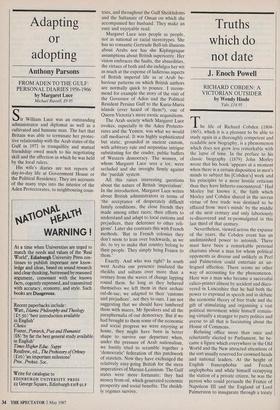Adapting or adopting
Anthony Parsons
FROM ADEN TO THE GULF: PERSONAL DIARIES 1956-1966 by Margaret Luce
Michael Russell, £9.95
Sit William Luce was an outstanding administrator and diplomat as well as a cultivated and humane man. The fact that Britain was able to terminate her protec- tive relationship with the Arab states of the Gulf in 1971 in tranquillity and mutual friendship owed much to his negotiating skill and the affection in which he was held by the local rulers.
His wife's diaries are not reports of day-to-day life at Government House or the Political Residency. They are accounts of the many trips into the interior of the Aden Protectorates, to neighbouring coun-
tries, and throughout the Gulf Sheikhdoms and the Sultanate of Oman on which she accompanied her husband. They make an easy and enjoyable read.
Margaret Luce sees people as people, not as national or racial stereotypes. She has no romantic Gertrude Bell-ish illusions about Arabs nor has she Kiplingesque assumptions about British superiority. Her vision embraces the faults, the absurdities, the virtues of both and she indulges her wit as much at the expense of ludicrous aspects of British imperial life as at Arab be- haviour patterns on which British authors are normally quick to pounce. I recom- mend for example the story of the visit of the Governor of Aden and the Political Resident Persian Gulf to the Kuria-Muria islands (ever heard of them?), one of Queen Victoria's more exotic acquisitions.
The Arab society which Margaret Luce evokes, especially in the Aden Protecto- rates and the Yemen, was what we would call mediaeval. It was highly sophisticated but static, grounded in ancient custom, with arbitrary rule and serpentine intrigue substituting for the cruder, public buffets of Western democracy. The women, of whom Margaret Luce sees a lot, were secluded and she inveighs firmly against the 'purdah' system.
All this raises interesting questions about the nature of British `imperialism'.
In the introduction, Margaret Luce writes about British administrators in terms of `the acceptance of desperately difficult family conditions, the close friends they made among other races; their efforts to understand and adapt to local customs and prejudices, their deference to other reli- gions'. Later she contrasts this with French methods. 'But in French colonies they don't seem to lean over backwards, as we do, to try to make that country belong to their people. They simply bring France to them.'
Exactly. And who was right? In south west Arabia our presence insulated the sheikhs and sultans over more than a century from the waves of change lapping round them. So long as they behaved themselves we left them in their archaic cul-de-sac; we adapted to their 'customs and prejudices', not they to ours. I am not suggesting that we should have lumbered them with maces, Mr Speakers and all the paraphernalia of our democracy. But if we had brought to them some of the economic and social progress we were enjoying at home, they might have been in better shape to survive our departure when, under the pressure of Arab nationalism, we hastily tried to scramble together a `democratic' federation of this patchwork of statelets. Now they have exchanged the relatively easy-going British for the stern imperatives of Marxist-Leninism. The Gulf states were more fortunate; they had money from oil, which generated economic prosperity and social benefits. The sheikh- ly regimes survive.


















































 Previous page
Previous page